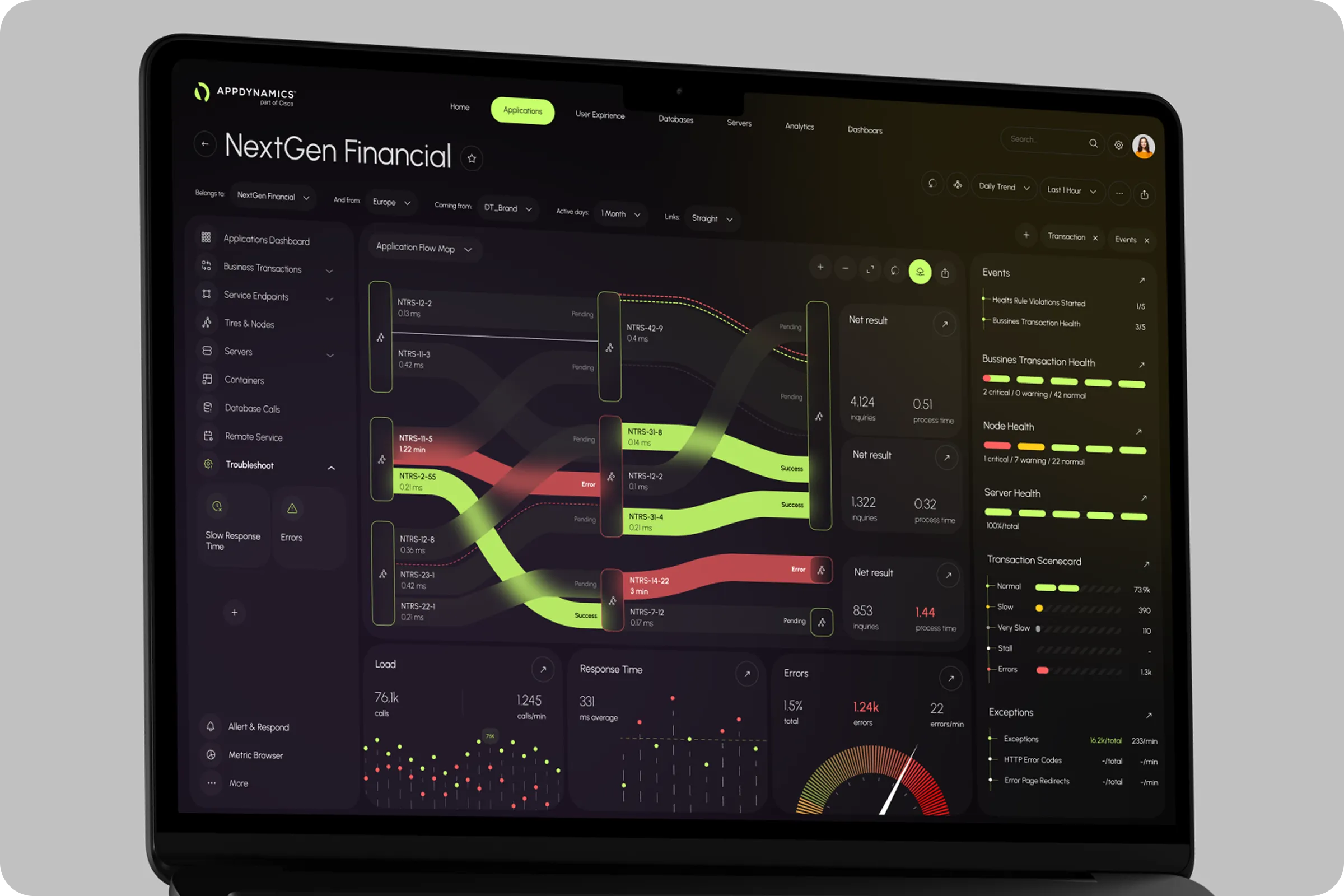
Homiq – Interactive 3D Real Estate Finder...
Homiq – Interactive 3D Real Estate Finder Mobile...
👀 3062 views
❤️ 337 likes

AI Monitoring Dashboard UI Design
We need a unified dashboard that simplifies real-time monitoring across complex application stacks, offering clear visualizations and actionable insights for faster issue resolution.
Co-founder at AppDynamics

App Performance Tracker Dashboard
AppDynamics - App Performance Monitoring Dashboard project is a UX/UI solution for tracking app and infrastructure performance. It helps reduce response time and improves how technical teams access critical system data. Our goal was to translate its complex tech into a clear, user-friendly experience.
Industry
APM (Application Performance Monitoring)
Category
SaaS
Location
Washington, D.C., USA

SaaS Software Development
Users faced fragmented metrics, outdated visual patterns, and rigid dashboards that didn’t reflect real-time behavior. Navigating logs, alerts, and performance graphs felt disconnected, slowing down incident response across teams.

Saas Dashboard UI Design
For AppDynamics - App Performance Monitoring Dashboard project we explored the entire user journey within the app - from triaging an alert to resolving the root cause. We aligned the design with IT workflows, ensuring performance data was visually prioritized, contextualized, and easy to act on.
Our aim was to support user goals, not just present data.

Team Lead

Infrastructure Monitoring Software Solution
We aimed to build a flexible web UI for AppDynamics that visualizes app behavior in real time, reduces alert fatigue, and enables faster root-cause discovery through a more connected, insight-driven performance management experience.

AppDynamics Dashboard Interface Concept
We conducted sessions with product managers, QA engineers, and developers to understand usage gaps. Real-time responsiveness and AI-supported event clustering were top priorities.
We used internal product audits, user session reviews, and data from CRM analytics reports to uncover key blockers. Focus remained on how UX UI decisions impact conversion rate, user retention, and engagement scores.
67% used non-AI flows
Users didn’t trust the existing AI logic. By adding clear visual explanations, adoption rose during testing by 32%.
41% delay in alerts
Notification logic didn’t match issue severity. This delay impacted response time and support metrics.
52% ignored historical data
Users preferred real-time metrics but missed patterns that caused repeated issues. We introduced compact trend visuals to improve awareness without overwhelming the layout.

System Health Monitoring Development
We implemented a flexible component grid, unified alert states, and layered service maps. The interface of AppDynamics - App Performance Monitoring Dashboard example now adapts based on user roles - whether they need executive overviews or deep-dive diagnostics - while maintaining visual consistency.
Role-Based Interface Logic
We designed the layout to respond to specific user needs - engineers, analysts, or leadership. Each role sees tailored views without extra navigation.
Unified Alert Structure
We introduced a single visual system for alerts across metrics and services. This helped users prioritize actions faster and reduced confusion from duplicate notifications.

AI-Powered Metrics Design
The AppDynamics - App Performance Monitoring Dashboard ui / ux increased alert response speed and reduced user drop-off. Engineers accessed key metrics 2.4x faster. Session duration rose by 39%, and dashboard interaction improved across all user roles.
+36% Faster Incident Resolution
Clear alert structure and improved data layout helped reduce mean time to resolution by 36%. Support teams handled issues with fewer steps and higher accuracy.

Performance Analytics UI Design

You don’t have to stop here, by the way. You can continue reading down below…
Shall we chat?
[email protected]Let’s

talk